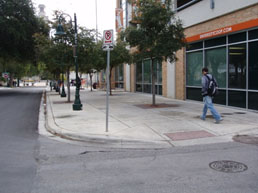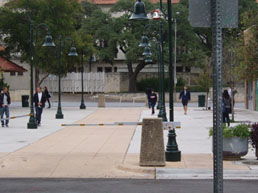
Wikimedia Commons
Austin as seen from the Congress Bridge
They say everything is bigger in Texas. The state’s capital, Austin, knew that all too well—especially when it came to parking congestion around the University of Texas’ West Campus neighborhood. As new regulation permitting denser land use spurred development, student motorists and commuters began crowding the streets. Insufficient parking increased pollution as motorists circled around to find available spaces. Transit vehicles were bottlenecked into one traffic lane. The neighborhood’s attractiveness was challenged, but city leadership took creative action, using federal funds to produce a local solution.
In 2005, Austin received a $43,275 U.S Environmental Protection Agency Mobile Source Outreach Assistance Program competitive grant to reduce car emissions. Using this award, the city initiated a Parking Benefit District (PBD) pilot in West Campus to manage the area’s unsustainable parking demand.
The city purchased and installed 96 parking meters between West 19th and West 26th streets along San Antonio Street, parallel to the neighborhood’s main drag, Guadalupe Street. Enforcement ran five days a week from 8 a.m. to 5:30 p.m. at a flat $1-per-hour rate with a two-hour time limit to ensure turnover. West Campus residents, who received permits for themselves and their guests, were exempted from paying any parking charges.

West Campus Streetscape Improvement
Source: austintexas.gov
To gain support for the installation of parking meters, community members were included in the decision-making process to determine how revenues should be spent. Of the meter revenues, 51 percent (minus the city’s expenses) were dedicated to the West Campus PBD, with the rest allocated to the city’s general fund. Mirroring Old Pasadena’s parking program, this allowed direct investment in neighborhood initiatives such as streetscape projects, at the discretion of local residents and businesses.
In the pilot program’s first year, meters generated $163,000 for the PBD; over $40,000 was devoted to streetscaping projects, including sidewalk and curb enhancements, benches, crosswalks, transit shelters and bike lanes. Over time, revenues grew. About $294,000 was allocated toward two specific projects: a sidewalk on 23rd Street and improvements for Rio Grande Street.
Program benefits have accrued since the launch. Increases in sales and mixed beverage tax receipts show local businesses have not been negatively affected. Also, long overdue streetscape projects designed to address aging sidewalks and curbs have now been implemented thanks to a reliable source of funding.
Because of the success of the five-year pilot program, in 2011 Austin established PBDs in a city ordinance, allowing any neighborhood to apply to implement a PBD as a strategy to manage parking, while using revenues for community improvements.
An independent association in the West Campus neighborhood, University Area Partners, advocated to establish Austin’s first full-scale PBD, covering much of the neighborhood. The number of parking meters more than tripled from the pilot to 350 metered spaces with a five-hour time limit and a $1-an-hour charge.

West Campus Streetscape Improvement
Source: austintexas.gov
In the first three months following the West Campus PBD launch, the district generated $119,500 in meter revenues, a remarkable increase over the pilot and more than was estimated. Of this amount after city expenses, $28,000 was returned to the district. Moreover, thanks to its use of Austin’s Neighborhood Partnering Program, the PBD received a matching benefit, resulting in $56,000 for more focused streetscape projects including sidewalks, trees and benches to accommodate pedestrian and bicycle traffic. These improvements have been doubly beneficial thanks to the city’s work with retail and commercial users to encourage the use of non-automobile transportation in the area.
What thus began as the groan and grunt of Longhorns fighting congested streets for scarce parking became an air quality initiative and community development tool that motivated other cities like nearby Houston to implement their own parking management plans. Even parking solutions can be bigger in Texas.
Solving the Parking Predicament Series
MPC’s Solving the Parking Predicament series offers an in-depth discussion of parking management. Beginning with a review of the parking problem and new strategies to solve them, each case study highlights best practices from around the country:
- Parking Meter Zones in Old Pasadena, Cali.,
- The SFPark smartphone app in San Francisco,
- The meter and permit system in Oak Park, Ill.,
- Performance Based Parking in Washington, D.C.,
- The EPA-piloted Parking Benefit District in Austin, Tex.,
- The Parking Improvement District in Boulder, Colo., and
- Payment-in-Lieu of Parking in Miami’s Coconut Grove neighborhood.
These case studies will show how parking can develop out of a headache and into a demand strategy that facilitates and supports the use of alternative modes of transportation, builds business activity and boosts community ambience.
Through CMAP’s Local Technical Assistance program, MPC is working with the Wicker Park/Bucktown Special Service Area to analyze how variable priced parking—charging different rates for parking based on shifts in demand at different times or days of the week—can achieve just the right number of available parking spots. The study also will determine if variable priced parking would create additional revenue to support neighborhood sidewalk and transit improvements—a spot-on solution for drivers, businesses and the community.